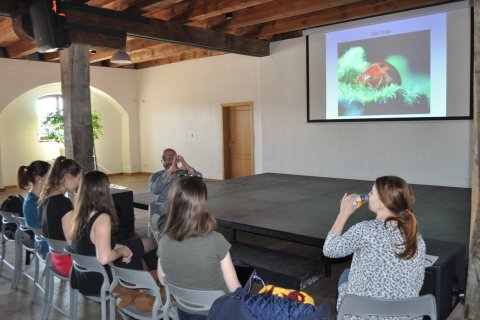Making knowledge together: addressing climate change through innovative place-based education

“We should change the way we teach about climate change”, argues Human Geographer Dr Bouke van Gorp from Utrecht University. “Climate change is often perceived a long-term, far-away problem, making it difficult for young people to see how it is relevant for them. In the EduChange project we therefore encourage our student teachers to bring the own, local experience of their secondary school pupils to the classroom through place based education.”
This is the basis of the EduChange project: an Erasmus+ strategic partnership aimed at innovating teaching about climate change. Each year six geography students from the Graduate School of Teaching participate in the project. EduChange aims to transform climate change education by using place based education and turning field courses into innovative, creative learning environments in which teachers, students and pupils create knowledge together.
European experiences
International exchange is an integrated part of the project, which is a cooperation between Van Gorp and her colleagues Hans Palings MSc and Dr Tim Favier from Utrecht University, and colleagues from the Norwegian University of Science and Technology in Trondheim, the University of Malta, and the Palacký University Olomouc in the Czech Republic. During a 7 day Fieldweek and a 5 day ScienceJam students from the 4 universities come together to learn about climate change and related water issues and how they can effectively pass this knowledge on to secondary school pupils back home. They design a lesson or series of lessons using methods of place based education and multi-media in their lessons.
Place-based education
The effects of climate change differ from place to place, from country to country. This aspect is integrated in the project. During the Fieldweek and ScienceJam students hear about and see the effects in other countries. However, their teaching will be place based and they therefore focus on the effects in the vicinity of the school. As climate change is a rather broad topic, the focus is on water issues related to climate change - tapping into the expertise on water education available in our department. Van Gorp explains: “We connect a global issue with scientific knowledge and local experience through place-based education. Focusing on water issues as one of the most visible manifestations of climate change, our student teachers for example asked their pupils to advice on water management. In preparation of their policy plan, the pupils went on a bike tour to do field observations.”
Open license
All teaching materials created during the project by teachers and students will be published online under an open license. More information about the project can be found on the website http://educhange.net
The researchers have received a strategic partnerships grant from the Erasmus+ programme of the European Union for the EduChange project, which runs from September 2017 until August 2020 (project no. 2017-1-CZ01-KA203-035519).

